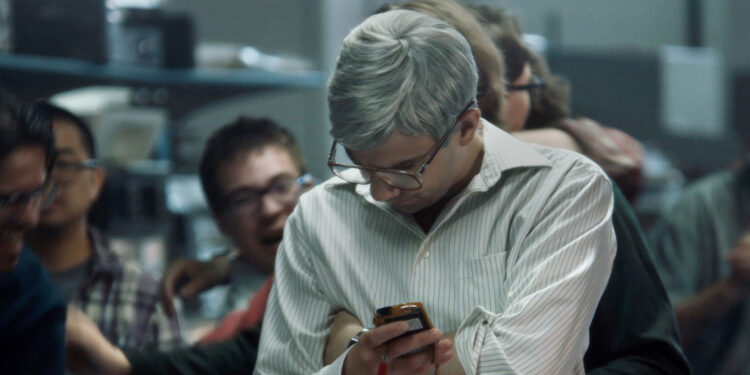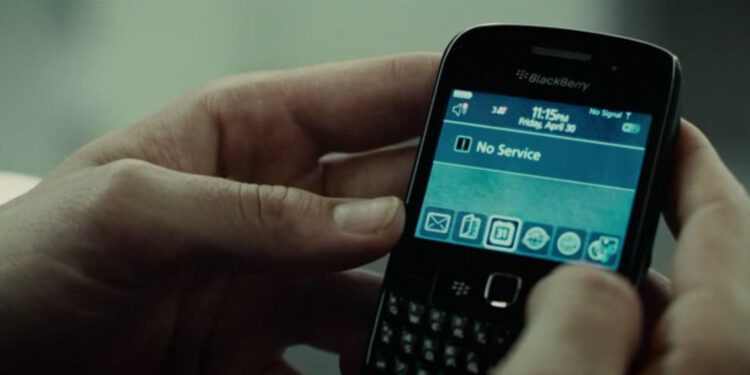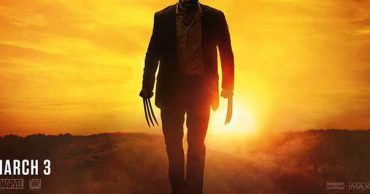The 2023 movie BlackBerry ends with the beginning of the smartphone’s downfall. Once a giant in the industry, the BlackBerry all but disappeared over the last decade; the company doesn’t even make cellular devices anymore. It’s a fitting conclusion to a story that is as much about the meteoric rise of the Canadian tech company as it is about the big personalities — and even bigger gambles — involved. The quiet, subdued dork Mike Lazaridis (Jay Baruchel) is both brilliant and clueless. His co-CEO Jim Balsillie (Glenn Howerton) is the polar opposite: a vicious-tempered attack dog with a nose for corporate culture but completely clueless when it comes to tech. Together, they were a powerful, but volatile, force.
Matt Johnson’s 2023 comedy-drama tells the real-life story of Research In Motion Ltd. developing the first personal device capable of sending and receiving emails. This was huge. Thanks to the BlackBerry, we all have gotten used to instant, near-constant access to our email and QWERTY texting. It’s easy to forget that just 2o years ago, online communication mainly required a computer. Cell phones could text, but it involved the painful process of cycling through letters on the numpad. The BlackBerry invented a new way to interact with your cell phone. Unfortunately, the company did not perfect it. The ending of BlackBerry explains the company’s downfall, and why this outcome was inevitable.
BlackBerry’s Final Scene Is A Darkly Funny Warning

All throughout BlackBerry, Mike was obsessed with two things: making his product perfect, and despising the cheap and fast manufacturing in China. To be fair to the film, the latter sentiment has nothing to do with anti-Chinese feelings — it’s the underlying capitalist motivations at play. Any North American company sending their contracts to China is almost certainly doing it to save money, and that can come at the cost of quality control. Mike says as much himself in one of the opening scenes, lamenting that the Chinese-manufactured intercom was carelessly constructed because the powers-at-be didn’t care enough to do it right. Mike, and his company RIM, would do things right.
Unfortunately, BlackBerry shows how the conflicting interests of business can cloud one’s judgment in the moment, leading to decisions that go against one’s principles. Not wanting to be usurped by iPhone (and seeming far too personally invested in BlackBerry being “the best” product on the market), Mike impulsively promises Verizon a whole new phone that didn’t exist. Needing to fulfill this contract with virtually no time for proper development, the device is hobbled together and sent to China for manufacturing. This resulted in the infamous Storm phone, a touchscreen model to compete with the iPhone that was a major embarrassment for RIM.
The last scene in BlackBerry is Mike opening the shipment, and discovering the phone works poorly and has the same buzzing he detected in the Chinese intercom at the beginning of the film. So he fixes the buzz, puts the phone back, and moves on to the next one. Mike stands alone in that dark warehouse, confronting the physical manifestation of his corrupted values; the movie ends with him diligently working through the pile like a resigned Sisyphus. Of course, it would be impossible to fix every single BlackBerry Storm, and that’s the point: the epilogue text explains just how disastrous the defective Storm model was for the company.
What Really Killed The BlackBerry

The movie BlackBerry is a dramatic retelling of RIM’s history, and as such, it tweaks some of the historic details. The true story of BlackBerry is that the company still exists — but in a very different form. One thing the movie doesn’t quite capture is just how first-in-class the technology was in terms of security. This is touched on briefly in the film, particularly how Jim’s (potentially incriminating) encrypted messages were completely inaccessible to investigators. For a time, many high-security firms relied on BlackBerry devices. The iPhone came out as a very expensive consumer device; it’s true that it usurped BlackBerry as a status symbol device, but it didn’t have the same appeal for those interested in data security.
Although BlackBerry fell out of fashion in the consumer cellphone market, it’s maintained a reputation for its secure servers and software. However, the real killing blow came not from Apple, but from Google: eventually, the Android operating system caught up with BlackBerry OS. As Ars Technica summarizes, “Unlike the people who developed Android, BlackBerry’s leadership was blindsided by the iPhone’s popularity.” As a result, the BlackBerry OS never meaningfully updated its approach to incorporate the features consumers loved, and eventually became obsolete. In January, 2022, BlackBerry “decommissioned the infrastructure and services” the smartphone once used, committing fully to its new mission of providing cybersecurity products to corporations and governments.
 Follow Us
Follow Us





